

That is, it cannot conflict with some other data that’s already in the database (consistent), it’s append-only (immutable), and the data itself is locked to an owner (ownable), it’s replicable and available. Finally, everyone agrees on what the state of the things in the database are (canonical) without a central party (decentralized). Decentralization is very attractive because it implies there is no single point of failure. That is, no single authority will be able to take away your asset or change “history” to suit their needs. » Jimmy Song
« In corporate circles, especially in financial institutions, it has become fashionable to say “I am interested in the Blockchain but not in Bitcoin”, which is the same as saying “I am interested in the web but not interested in the Internet” (remember Intranets?), not understanding that the web could not exist without the Internet. The only innovation of the Blockchain is it’s sovereignty, the only sovereign Blockchain so far is the Bitcoin Blockchain and the fuel that keeps it sovereign is the Bitcoin currency. It is like a boa eating its own tail. » Wences Casares.
The next era of crypto and 1B wallets by 2030 - @blockchain - Medium. Over the past two years, we have quietly redesigned and rebuilt the experience at Blockchain.com.To better reflect and anchor impactful changes made to our design system, we are giving our logo a refresh.
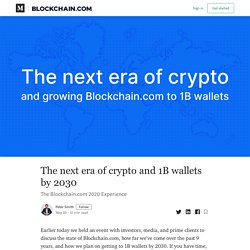
In the coming weeks, our website will get a refresh. Here’s a sneak peek: The Blockchain.com Explorer continues to be one of the most popular (and important) data sources in crypto. We’re updating the Explorer with a simpler, cleaner UI. Users will notice more intuitive navigation with more opportunities for discovery and exploration. In addition, we continue to build on our data products. The Wallet is the heart of the Blockchain.com experience.
We’re building the last wallet you’ll ever need. The Fastest Way to Buy Crypto Customers can now buy crypto with a credit or debit card faster and easier than ever. Interest Accounts For the millions of people holding BTC, you can now deposit it into an Interest Account and watch it earn 4.5% interest annually. Borrow A Unified Crypto Experience. How Blockchain Is Changing The Game For Social Impact Initiatives. As a digital, peer-to-peer, decentralized, distributed ledger, blockchain has the potential to transform systems and enable solutions we never thought possible.
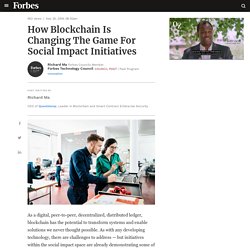
As with any developing technology, there are challenges to address — but initiatives within the social impact space are already demonstrating some of blockchain’s advantages over traditional solutions. Reducing Risk And Fraud. "We optimized our blockchain for maximum throughput" Since the invention of banking, the global financial system has become increasingly centralized. In the modern system, central banks now control everything from interest rates to the issuance of currency, while government regulators, corporations, and intergovernmental organizations wield unparalleled influence at the top of this crucial food chain.
There is no doubt that this centralization has led to the creation of massive amounts of wealth, especially to those properly connected to the financial system. However, the same centralization has also arguably contributed to many global challenges and risks we face today. Flaws of the Global Financial System Today’s infographic comes to us from investment app Abra, and it highlights the seven major flaws of the global financial system, ranging from the lack of basic access to financial services to growing inequality. 1. 2. 3. However, just the opposite is true. 4. 5. These are people who have: 6. 7. What is Blockchain Technology? Chapters Chapter 1 - Blockchain 101 Contents.

Why Blockchain is Hard. The hype around blockchain is massive.
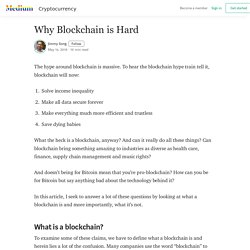
To hear the blockchain hype train tell it, blockchain will now: Solve income inequalityMake all data secure foreverMake everything much more efficient and trustlessSave dying babies What the heck is a blockchain, anyway? And can it really do all these things? Can blockchain bring something amazing to industries as diverse as health care, finance, supply chain management and music rights? And doesn’t being for Bitcoin mean that you’re pro-blockchain? In this article, I seek to answer a lot of these questions by looking at what a blockchain is and more importantly, what it’s not. Blockchain is not only crappy technology but a bad vision for the future. Blockchain is not only crappy technology but a bad vision for the future.
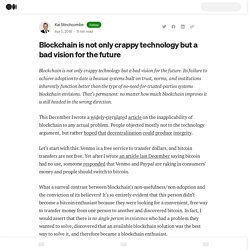
Its failure to achieve adoption to date is because systems built on trust, norms, and institutions inherently function better than the type of no-need-for-trusted-parties systems blockchain envisions. That’s permanent: no matter how much blockchain improves it is still headed in the wrong direction. This December I wrote a widely-circulated article on the inapplicability of blockchain to any actual problem. People objected mostly not to the technology argument, but rather hoped that decentralization could produce integrity. Let’s start with this: Venmo is a free service to transfer dollars, and bitcoin transfers are not free. What a surreal contrast between blockchain’s non-usefulness/non-adoption and the conviction of its believers! A blockchain is a literal technology, not a metaphor. Why people get blockchains so wrong. The “blockchain magic” piece I wrote in 2017 is still topical.
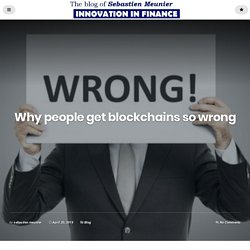
Every single day the public is exposed to delusional articles about how “blockchains” and “distributed ledgers” are going to revolutionize some new business areas. The main reason why there is so much fake news about blockchains is that “blockchain technology” does not actually exist. People make empty statements about an empty concept. Before nailing that down, let’s review other reasons why the blockchain delusion developed. 1. In recent years, the news media has switched from rigorous fact-based reporting to emotion-driven click-bait infotainment. 2.
A huge majority of the pieces about blockchains are written by people who have something to sell (technology providers, consultants, speakers, etc.). “It is difficult to get a man to understand something, when his salary depends on his not understanding it” 3. Most people lack IT education in two ways: 1/ People don’t know how standard development methodologies work. 4. Why Blockchain will revolutionize the banking industry.
Bitcoin, Not Blockchain. Blockchain Business Cases. Scalability. Blockchain Development. Crypto Wallets. International Online Money Transfer. How the blockchain will radically transform the economy [ TED Talk : Bettina Warburg ] How the blockchain is changing money and business [ TED Talk : Don Tapscott ] Blockchain Phone: Features, Wallet, and Dapps.